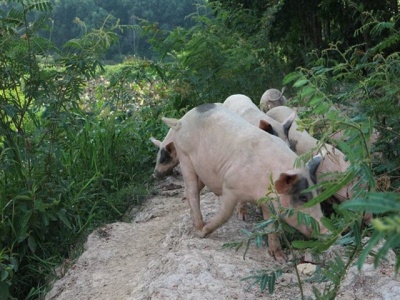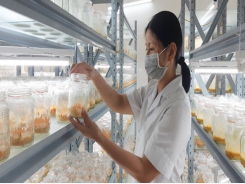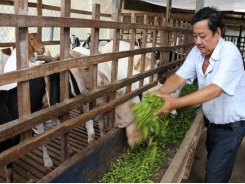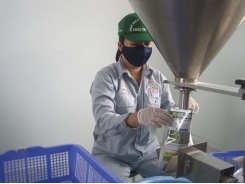Vietnamese agriculture, but not as you know it

QUẢNG TRỊ - A herd of pigs runs up a high hill, in front of them, a vast farm spreads out, reaching the horizon.
Hoà’s pigs enjoy their natural habitat. - VNS Photo Khoa Thư
The image may be strange for most Vietnamese people, with the mindset that domestic livestock are usually kept in cages.
Nguyễn Thị Hoà’s farm in Triệu Thượng Commune, Quảng Trị Province, offers pigs precious freedom that their fellow animals rarely enjoy.
“We are the first and also the only farm in the whole area that rears pigs in their natural habitat,” Hoà said.
“They find and eat whatever they like. They run as far as they can, to every corner of this 10 ha farm. Our pork, therefore, has distinct characteristics of colour, taste and balanced fat ratio that normal farms cannot offer,” she added.
Pork, however, is not the only specialty offered by Hoà.
Up to 1,500 chickens are also farmed on the space. Instead of simply pouring instant pre-mixed food out of bags, she has banana stems chopped and mixed with rice bran to feed chickens. Despite looking small, the meat and eggs from Hoà’s farm is loved by people in the neighborhood for their superb quality.
“We save most of the farm for lotus ponds and lakes containing fish. While we can only harvest lotus seeds in the summer, the lakes offer us organic fish, prawns and snails all year round.”
“The whole system can nurture itself and there is no waste. Even dried lotus heads, after removing all seeds, can be used to keep chickens warm in the winter,” she added.
Organic agriculture has nothing to do with Hoà’s farm. Although it is not accredited, people learn by seeing and through word-of-mouth that her products’ are 100 per cent natural.
While exerting a lot of effort operating the farm naturally as an ecosystem, the economic value that Hoà earns is not that high.
“A kilo of pork is normally sold at VNĐ55,000 (US$2.4). Meanwhile, I can offer it at just VNĐ50,000 ($2.15),” Hoà said.
“As customers are my acquaintances who buy directly from me, the price can never be too high,” she explained.
Hoà’s farm is not the sole model practising natural farming in the province. The weakness, however, is the ability to approach the market and gain profits that they deserve.
At the same time, not many people, especially those living in cities, can enjoy the fresh and healthy food cultivated in these farms.
Fortunately, there is a hand that gives.
Farming joy
In October last year, Quảng Trị Province’s Women’s Union established a special stall in Đông Hà to introduce specialties from local farms. Three days a week, the stall connects farmers with customers, exposing them to better opportunities in the market and promoting green agriculture.
The stall follows other efforts which have been made in some local districts where the provincial Women’s Union offers its members training courses on practising sustainable agriculture, provide seeds, small loans and also plays the role of a monitoring body over the process.
“It is an exclusive and comprehensive chain,” said Đỗ Thị Lý, the union’s head.
“Before, these farmers could only sell their products to local wholesale markets or to their acquaintances. Having no bargaining power, those products are sold lower than their real value. Here at the stall, we allow them to set the prices. As city residents, customers have financial ability to pay more for products than wholesale dealers do,” she added.
Vĩnh Thành Commune’s glass noodles, Đại An Khê Commune’s rice cakes, Cửa Việt Beach’s fish sauce or Cùa Area’s peppercorn – all products bear the names of their origins. Sometimes, farmers’ names are attached to their products as customers appreciate them for their excellent quality.
“I wait every Thursday to buy pork from Tráng in Gio Hoà Commune. Think about chickens or eggs, it should always be Hoà’s cooperative in Triệu Thượng who supplies the best. Before this stall opened, I couldn’t find any products with such high quality,” said Nguyễn Quỳnh Giang in Đông Hà City.
In addition to introducing local specialties to customers, the stall serves as a middleman connecting enterprises and farmers.
Hoà recently closed a deal to supply chicken to a clay pot rice restaurant in Đông Hà. Coop Mart Đông Hà, the province’s biggest supermarket, has started stocking taro planted in Vĩnh Hiền Commune and watercress grown at farms in Gio An Commune. All these products are cultivated sustainably without using any chemical fertilisers.
The first signs are positive, yet a lot of issues remain.
“Co.op Mart offers local taro at VNĐ9,900 (43 cents) per kilo but it is not as good as VietGap-accredited taro from Đà Lạt priced at VNĐ29,900 ($1.3) per kilo,” said Nguyễn Thị Thục Nữ, a member of the union’s economic board.
“The next steps will involve branding and acquiring certificates of quality. Since not many households practise clean agriculture and the size of cooperatives is relatively small, I think it will be difficult for them to earn certificates. The union will take efforts to accompany them on the long journey ahead,” she said.
Although there are many things to do to deliver fresh produce to more customers, to farmers, official accreditation is not their primary concern.
“I feel good when I work on my farm. I enjoy the autonomy of making my own decisions, respecting nature and cultivating in a green way. When they talk about me, people mention my products first. That is the joy of being a farmer,” Hoà stressed.
Có thể bạn quan tâm
Phần mềm

Phối trộn thức ăn chăn nuôi

Pha dung dịch thủy canh

Định mức cho tôm ăn

Phối trộn phân bón NPK

Xác định tỷ lệ tôm sống

Chuyển đổi đơn vị phân bón

Xác định công suất sục khí

Chuyển đổi đơn vị tôm

Tính diện tích nhà kính

Tính thể tích ao hồ




 Ben Tre calls for more investment in agriculture
Ben Tre calls for more investment in agriculture  Fertilizer, plant protection drugs threaten agriculture sector
Fertilizer, plant protection drugs threaten agriculture sector